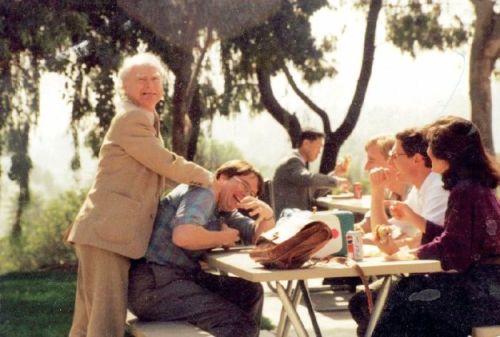Christmas is over as far as the Western cultural celebration. But in the Church calendar, Christmas doesn’t begin until December 25, and it lasts for 12 days. So let’s take advantage of the season, now that the busy-ness is over, to talk about the Incarnation.
The Christmas carol “God Rest Ye, Merry Gentlemen” has a line in one of its verses that goes like this: “This holy tide of Christmas all others doth deface”. I think “deface” meant something a little different back then–perhaps “render obsolete” would get closer to the meaning now.
In any event, it’s a bold statement–to privilege the Nativity and its commemoration above all other Christian remembrances. And in one sense the statement is quite false. The Crucifixion and Resurrection have a far greater place in Christian remembrance, celebration, and salvation theology. Without the Crucifixion and Resurrection, the Nativity would be of no value to us. It would be a stupendous, marvellous, praiseworthy, and ultimately unhelpful (to us sinners) display of God’s power.
Yet in another sense, the carol is right. Before the Incarnation, the Crucifixion and Resurrection were more than merely unimaginable. They were inconceivable. How could God, who is infinite, eternal, and unchangeable, become for his people the perfect sacrifice and the perfected human righteousness without which we must be condemned? How could the changeless change? How could the limitless take on limits? How could the immortal die?
Before the Incarnation there was scarcely a way to frame these questions let alone have any chance of guessing their answer. But once God has appeared in the flesh, his people can conceive of the possibility that he will offer himself up on their behalf and then, taking up his life again, precede them into heaven. Conceiving that, they might have the audacity to hope for what before was inconceivable.
The inconceivableness of the Incarnation weaves itself into Scripture from the very beginning. You will find it in the story of creation. What could be more plainly written into the Genesis account than this–that the distinction between Creator and creature is insurmountable and inviolable?
God creates humankind male and female, not as little gods but as creatures in God’s image. This language emphasizes at once the similarity and difference between man and God. They are like God not as his equals nor as lesser beings of the same sort, but as reflections, as analogies. So man is called to work just as God worked in creation. Yet man’s work is of a different quality. God’s work is simply speaking and seeing things brought into being from nothing by the power of his word.
Man’s work is not of this sort, yet it is similar. It is analogous. It is a reflection. Man’s work, though creaturely, is modeled on the work of his Creator. Yet the nature of this work is easily distinguished. God and his work are on one level, man and his work on another. Though analogous, the two cannot–and must not–be confused.
In the same way, by resting on the seventh day, God implicitly invites man to a similar rest. Yet man’s rest involves ceasing his creaturely activity and refreshing himself. It is like God’s rest but the two could never be confused. (There is a bonus here for those who understand the Framework Interpretation. We see clear notes in the creation account that man’s “days” are not the same as God’s but analogous to them. Even here the distinction between Creator and creature is preserved.)
Notice that this distinction between Creator and creature arises and is insisted on in Paradise, before the Fall. The distinction–even, so to speak, the distance–between man and God does not arise because of God’s holiness and man’s sin. Even before sin entered the world, God was God and man was man. Neither one could be the other.
Yet at the Incarnation, God did become man. The thing is impossible! The Creation story pounded it into our heads that such a thing could never, by any imaginative stretch, happen. Yet it happened! Before it happened, nothing could have been more unthinkable. It was beyond comprehension. After it happened, nothing could have been more amazing. I do not have enough awe in me to meet this event with the amazement it deserves. At times, the clouds part and I catch the merest glimpse of the amount of awe the Incarnation should inspire and I find myself in awe of how much awe that is.
When we add sin into the mix, the thing becomes more awesome still.
It is amazing enough that God the Creator should become, impossibly, a creature. It can only add to our amazement that the Holy One, who cannot dwell with sin, became a creature so he could dwell among sinners.
God made Moses take off his shoes before approaching the burning bush. Even the surrounding ground was holy. When God appeared at Sinai, he told Moses not to let the people approach or they would perish (Exodus 19:21). When the angel of the Lord announced the coming birth of Samson, Samson’s father Manoah said, “We shall surely die for we have seen God” (Judges 13:21). When Isaiah saw the Lord in the temple, high and lifted up, he did not rejoice. He cried, “Woe is me! For I am lost; for I am a man of unclean lips, and I dwell in the midst of a people of unclean lips; for my eyes have seen the King, the Lord of hosts!” (Isaiah 6:5). How could this infinitely holy God come and dwell among sinners without consuming them?
And what sort of sinners are we? Go back to the beginning and find out. How does the Serpent tempt the woman? He says, you can be just like God, deciding for yourself what is good and what is evil. In other words, you don’t need to be content with being in the image of God–a mere reflection and analogy. You can become exactly like God. The Creator-creature distinction is a myth.
That’s what Original Sin is–an attempt to surmount the distinction between creature and Creator. Naturally, that is impossible.
To redeem such sinners, God does the impossible. He surmounts the Creator-creature distinction. Man fell because he wanted to become God. God saves by becoming a man. The redemption fits the crime.
What man could not do, what caused man to fall when he tried to do it, God, out of his boundless mercy and infinite love, has done. That’s the glory of the Incarnation, of this Nativity that we celebrate. It is beyond all telling.
Merry Christmas to all,
Bill
Christmas Day 2006
(For a follow-up to this post, see The Incarnation and Ethics posted on March 6, 2007.

